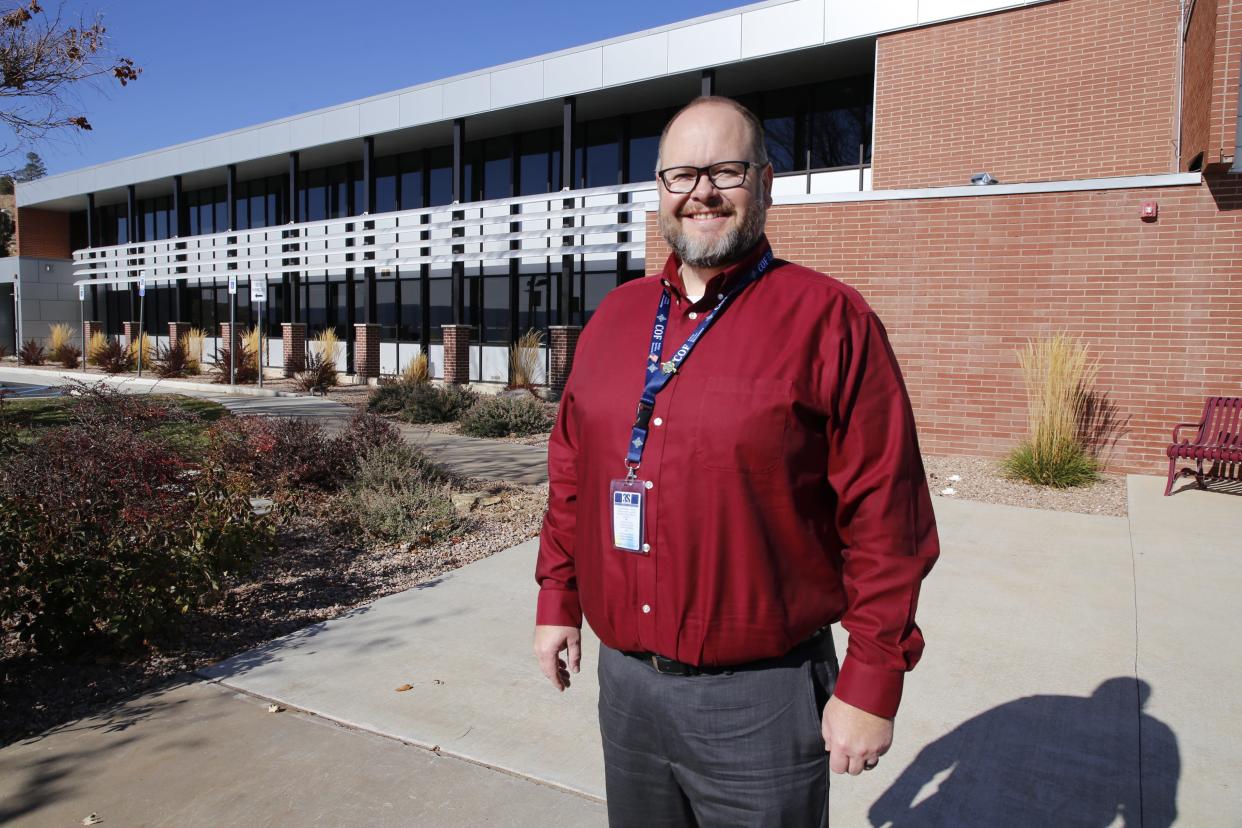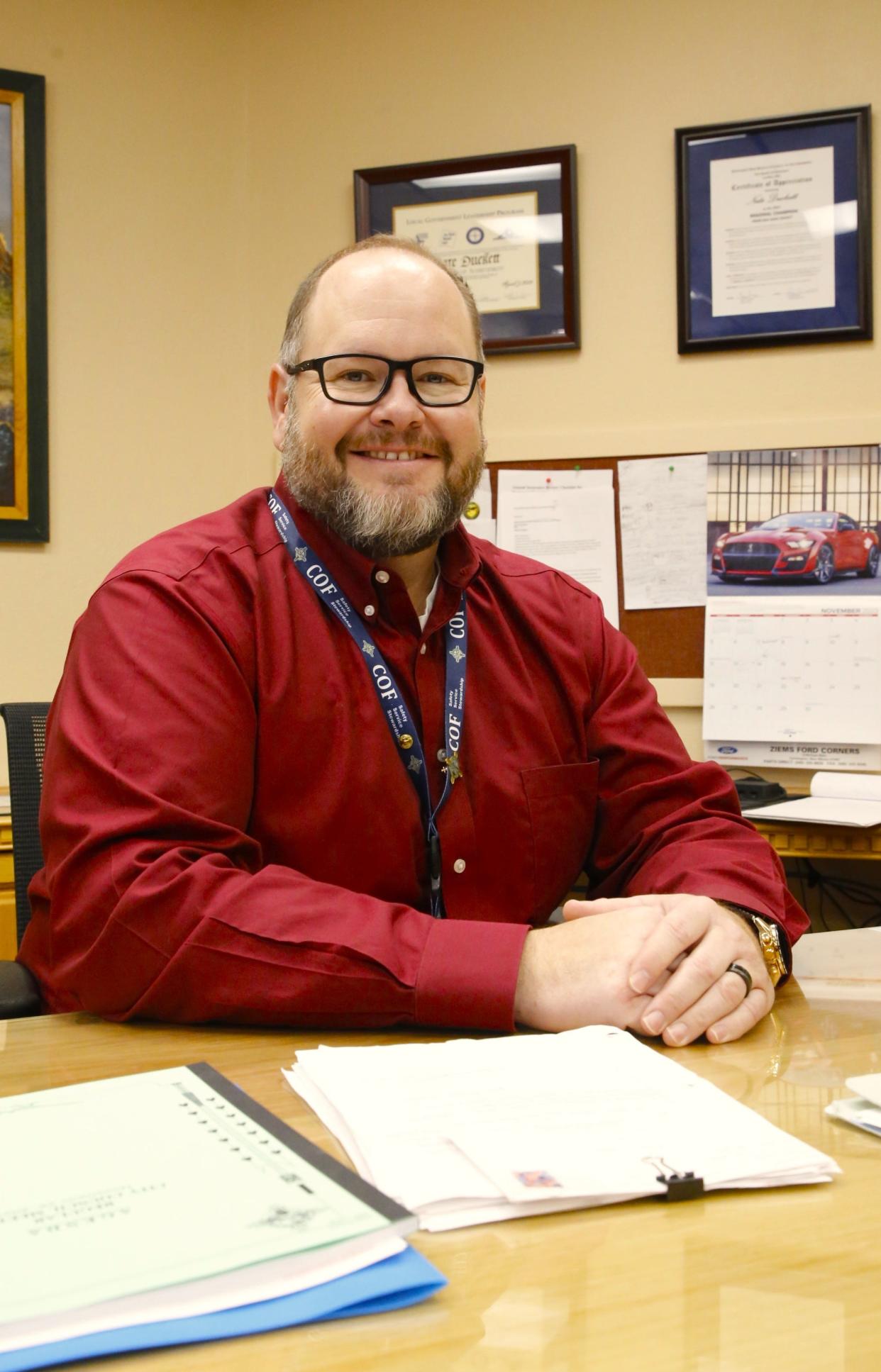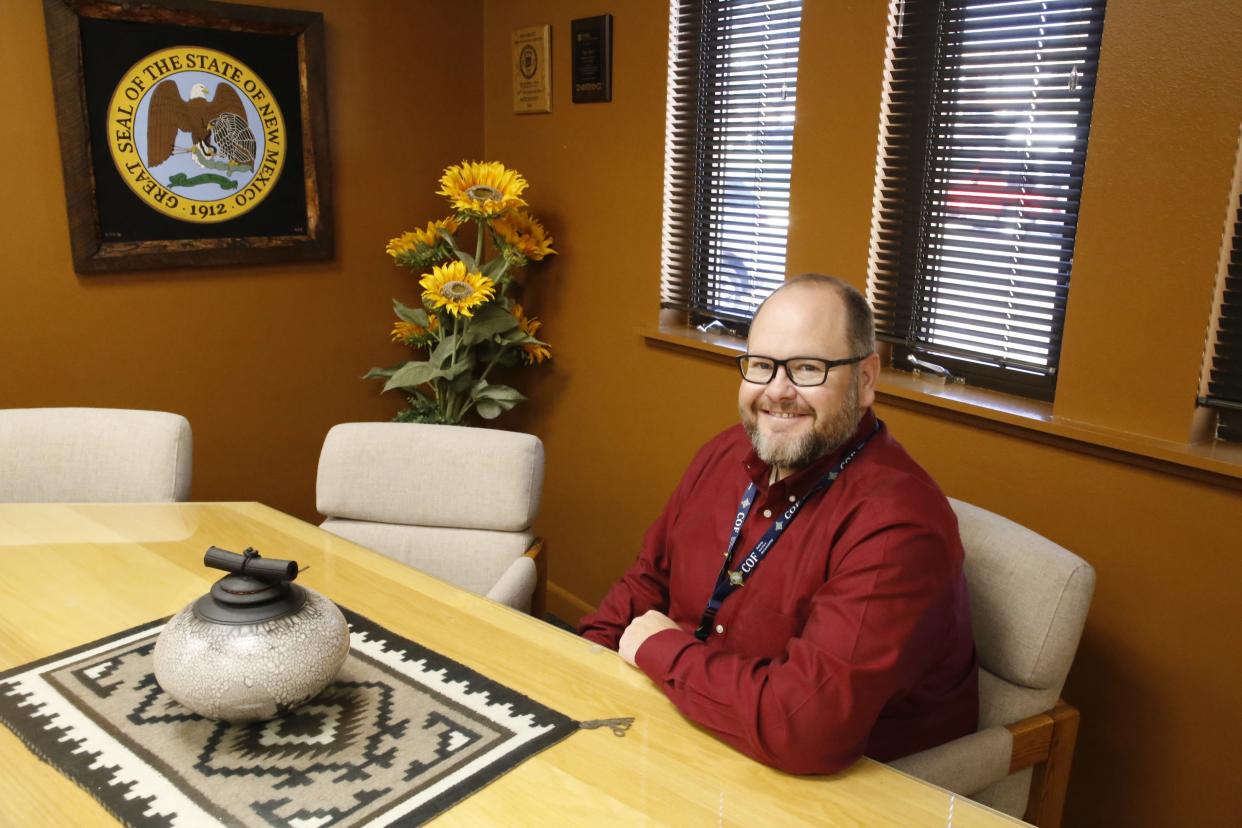Farmington Mayor Nate Duckett looks ahead to challenges of second term
Nearing the end of what he calls the longest single term in office of any leader in Farmington’s history at five and a half years — a period that in many ways served as a transformative chapter for the city — newly re-elected Mayor Nate Duckett already has turned his attention to what lies ahead over the next four years during his second term.
“Some benchmarks have not been met,” he said. “And some projects we kicked off during the last term are just now breaking ground.”
It’s not that Duckett isn’t interested in revisiting the recent past — in fact, he’s said he’s proud of the progress the city has made, the way it has weathered the challenges it has faced and the role he has played in making those things happen. It’s just that he’d rather talk about how the city might prosper in the near future as the strategies developed over the last several years begin to have an effect.
“Certainly, there were times that became more challenging than other times, that make you question yourself,” he said. “But I believe in the direction we’re going. Farmington’s best days are ahead, and I want to be a part of that mission.”

Since he was elected mayor in March 2018, Duckett has overseen one of the more consequential periods in the city’s history. In that time, the city has experienced numerous highs and lows, including:
the reopening of the Farmington Civic Center after an $11.5 million renovation and expansion
he opening of the $8 million Bisti Bay at Brookside Park aquatic park
$500,000 in improvements to recreation areas at Lake Farmington
the nearly $12 million streetscape and infrastructure renovation of the downtown district as part of the Complete Streets program
a global pandemic that was devastating to the nearby Navajo Nation in its early stages
the closure of one of the county’s main economic drivers, the San Juan Generating Station and the coal mine that supplied it, resulting in the loss of hundreds of jobs
an aborted attempt to keep the plant operating through the use of experimental carbon-capture technology
the $1 million renovation, acquisition and reopening of the Totah Theater downtown
millions of dollars in upgrades to the Four Corners Regional Airport as part of an effort to bring back passenger air service
a mass shooting by a Farmington High School student earlier this year that left three victims dead and two police officers wounded
and a concerted, county-wide shift toward promoting an outdoor recreation-based economy.
Duckett played a major role in some of those developments and only a peripheral role in others, but they all occurred during his first term, which, because of a consolidation of municipal elections and a shift in the election calendar, lasted significantly longer than the normal four years. Perhaps it was the demanding nature of that five-and-a-half-year period that made it seem so much shorter to him.
“It’s amazing how quick that time goes by,” he said.
Duckett said he takes the fact that he ran unopposed — after his only challenger, local businessman Alexander Chambers, was declared ineligible after filing for the race in August — as a signal that voters believe he and the City Council are doing the right things.
“We’re still focused on economic diversification,” he said, explaining that a major part of that effort involves creating and promoting quality-of-life and cultural amenities that will serve as a mechanism for attracting visitors from outside the region and keeping them here for a longer period. “That will remain our focus for the next four years.”
'It couldn't just be dark and gloomy'
When Duckett began his career in public service in 2014 by being elected to the City Council, he said he was struck by the fact that his relative youth made him an oddity — not just in Farmington, but among the leaders of most governing bodies and large entities in the county. Most of his fellow city councilors in Farmington had been at it a long time, he said, and they were entrenched in positions that often left them at odds with their counterparts.

“Prior to 2014, that council was very split on a number of initiatives,” he said, describing how difficult it was to achieve substantive change in the city in the face of those often-conflicting perspectives.
But, beginning with Duckett and continuing to the present day, the Farmington council has seen an infusion of relative youth.
“We brought in a younger generation — much younger than when I was elected (to the council),” he said.
Most of those younger leaders — San Juan College President Toni Hopper Pendergrass, San Juan County Manager Mike Stark and Farmington Convention & Visitors Bureau executive director Tonya , among them — had something in common, Duckett noted. They had families with small children, and they wanted to build a different future for their kids than what San Juan County, seemingly caught in a downward economic spiral brought on by stagnant or declining energy prices, offered at the time.
“They didn’t see hope,” he said.
The energy sector that had sustained the county’s economy for decades was floundering in 2012 and 2013, Duckett said, with many companies selling off their interests here and moving on. Things got even worse a few years later when it became clear the San Juan Generating Station’s days were numbered with the passage of the state’s Energy Transition Act in 2019, which began a phase-out of coal-fired power plants in New Mexico.
“It was a crisis moment,” Duckett recalled. “ … There were legitimate concerns this city didn’t have a future based on the exodus of those companies.”
Duckett shared the sentiment of other young leaders who saw the community was overdue for a transformation.
“We’ve got to change the mindset,” he said, describing the consensus the group quickly reached. “It couldn’t just be dark and gloomy. The first thing is, we’ve got to change the attitude about the place we live.”
Duckett credits Stinson with being the one who articulated what that new vision should be.
"She came up with the marketing campaign that basically said, ‘We’re more than an industrial town,’” he said, referring to Farmington’s long history of relying on the fossil fuels sector for its economic well-being, as well as its identity.
That campaign sparked a sea change in local economic development efforts. Government, business and academic leaders across the county quickly rallied around the idea that the county was missing an enormous opportunity by failing to adequately develop and promote its outdoor recreation amenities.
“Everything’s just an idea or a thought until it gets funded,” Duckett said, describing the difference between talk and action. “But in 2019, we said, ‘We’re going to fund outdoor recreation’ because we had to.”
In retrospect, the lack of attention that was being paid to the economic potential of outdoor recreation in San Juan County seems like a glaring oversight, Duckett acknowledged. There was so much low-hanging fruit in that arena, even in relatively urbanized Farmington, that it was difficult to know where to start.
After all, he said, 60% of the state’s surface water flows through San Juan County, rendering it relatively saturated compared to most of the rest of bone-dry New Mexico. And with 94% of the county in federal, state or tribal hands, there are practically limitless opportunities for hiking, mountain biking, four-wheeling, fishing, camping, kayaking and sightseeing in what Duckett refers to as Farmington’s “fantastic backyard.”
Yet, until recently, all those natural advantages rarely came up in local economic development discussions.
“Prior to 10 years ago, you couldn’t recreate at Lake Farmington,” he said, shaking his head in amazement and ruefully adding that it was only a few years ago that the first river rafting company began operating in the city.
“How in the world was that the case all these years?” he asked rhetorically.
Positive feedback, improving attitudes
Since 2019, the inventory of outdoor attractions throughout Farmington and the rest of the county has multiplied exponentially. New camping areas, trails and boat ramps open with regularity, and plans for additional outdoor amenities — including the construction of a standing wave suitable for surfing on the Animas River near the Farmington Museum and two large mountain biking parks — abound.

Additionally, the city is committed to building a new, $13 million all-abilities park on the site of the old Tibbetts Middle School just north of downtown, as well as a high-profile, showplace park on the banks of the Animas River on land surrounding the Farmington Museum at Gateway Park. The first phase of the latter project will include an enclosed farmers market pavilion, an amphitheater and extensive landscaping on what is now an unsightly, weed-infested patch of bare earth.
Duckett pointed to two large in-state gatherings held in Farmington in recent months — the annual meeting of the New Mexico Association of Counties and the New Mexico Municipal League — and said the reaction he heard from attendees about the city’s makeover was gratifying.
“The feedback was overwhelmingly positive,” he said. “People were blown away by what we have done in the last decade.”
That attitude has filtered down to local residents, Duckett said.
“We are taking more pride in places where we live now,” he said. “But we still need to set the bar higher than that, and that always starts with yourself.”
The mayor said he makes a habit of going out to pick up trash on his own street on a weekly basis. And when he speaks to out-of-town visitors, he said he commonly hears them remark on how clean the city is — something he chalks up to an aggressive street-sweeping campaign overseen by public works director David Sypher.
“David is adamant about how important it is to the life span of pavement to keep the streets swept,” he said.
A more inviting community
Other changes are perhaps more difficult to measure but just as important, Duckett said, citing his belief that the city’s Navajo population is far more integrated into the fabric of life in Farmington than it was even a generation ago.
“I think people find this community more inviting,” he said. “My goal is always to create an environment where everybody felt comfortable. We want to present the best opportunities for everybody. And when it comes to opportunity, it’s open to everybody.”
Duckett said he senses a change in Farmington’s identity over the last four years — one that extends well beyond its economic fortunes to the way its residents view their civic responsibilities.
“I believe the collective attitude has shifted and people want to be part of the solution instead of complaining about a problem,” he said.
As for his own future, the mayor figures to continue leaving his own mark on the city for the duration of his second term — and perhaps even longer.
“I see myself staying in an elected role on behalf of Farmington for a long time,” he said, explaining that might involves a third term as mayor or perhaps a stint in the state Legislature.
In the meantime, Duckett still has plenty of items on his agenda for his second term. Ensuring the return of passenger air service to the Four Corners Regional Airport, helping other leaders in San Juan County secure the construction of a railroad spur here and the continued expansion of the outdoor rec economy are at the top of that list, he said.
If the mayor has a pet project in mind, he said it’s seeing to it that the planned Gateway Park is completed and built to the standards he envisions.
“I think it’s going to an iconic park and another extension of our riverfront,” he said, citing the project as a place where he hopes the entire community will gather. “You need a place on Main Street everybody drives by and says, ‘Man, that’s beautiful.’”
Mike Easterling can be reached at 505-564-4610 or measterling@daily-times.com.Support local journalism with a digital subscription: http://bit.ly/2I6TU0e.
This article originally appeared on Farmington Daily Times: Farmington mayor has overseen consequential period in city's history
